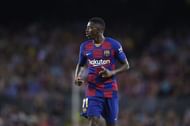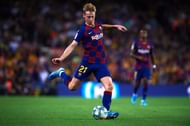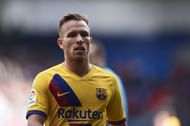#3 Ousmane Dembélé

The names of people who have already handed out plaudits to Ousmane Dembélé read like a who’s who at the Camp Nou. Iniesta and Messi have spoken publicly about the talent and ability that the French international possesses, and he has already amassed a wealth of experience for both club and country. Messi has described the versatile star as a ‘phenomenon’, and such high praise is not distributed lightly.
Although he is still only 22, Dembélé has been playing senior club football since 2015, starting his career with Rennes in his native France. The German Bundesliga is currently considered to be an important league in developing young talent, and it provided Dembélé with a platform when he arrived at Borussia Dortmund in May 2016. It was a move that immediately attracted interest in his services from across the football world.
A significant transfer fee brought Dembélé to the Camp Nou the following summer, and while it compensated for the departure of Neymar, it also added to the pressure placed upon him to perform to the highest of standards with immediate effect. His versatility means that he will command a place in the Barcelona starting line-up, but the biggest challenge facing him could be his concerning injury record.
With the complete arsenal of tools available in his game, the praise he has received is deserved, and if he can put his injury problems behind him, he will be a vital player for Barcelona in the very near future. Dembélé has the potential to lead this next generation through the course of the next decade, and his early exposure to the pressure and expectancy that comes naturally to the club will make him mentally stronger in facing the challenges that will inevitably come his way
#4 Frenkie de Jong

Described by Dutch legend Marc Overmars as a player with the potential to become the next Xavi or Iniesta, a move to Barcelona was always destined for the prodigious talent that is Frenkie de Jong. Still only 22, the midfielder has earned himself rave reviews with his performances for former club Ajax in the UEFA Champions League last season, and a move to one of the prominent forces in the European game became increasingly inevitable.
Ajax have a tradition of nurturing young talent, and with an early appreciation over just how good De Jong could be, no chances were taken as he was gradually introduced and protected as he made the step-up to the senior game. The position that Dde Jong finds himself most comfortable requires a high-degree of maturity, and his ability to read the game has been a catalyst to the attention that he has attracted.
Just how De Jong develops at Barcelona will depend on his character and his ability to deal with the pressure and expectation that comes from the intensity of performing consistently at the Camp Nou. There is a tradition of Dutch talent that defines certain eras at this club and while he still has a long way to go to emulate figures like the great John Cruyff, it is that yardstick that should provide his biggest incentive and inspiration as he takes hold of this particular baton.
Building a new generation at Barcelona requires the right balance, and it is the versatility of de Jong in his central position that ensures he can grow as his experience of domestic and European competition increases. Others may develop at a faster pace, but there is a creativity combined with his defensive strengths that could make him a more valuable commodity to this side in this time of transition. He may not grab the headlines like others who will be a part of this new era but his true value will be in how much he is missed when he is not there.
#5 Arthur Melo

Of course, no generation of Barcelona would be complete without some South American influence, and it is the talented Arthur Melo who can provide this particular cultural element. A product of the Grêmio youth system in Brazil, Arthur attracted a host of potential suitors from across Europe prior to his arrival at the Camp Nou on a lucrative six-year contract in the summer of 2018. The investment in his services displayed a clear belief that the midfielder is one for the future.
Melo is another young talent who has earned great praise from his midfield predecessors at the Camp Nou. Xavi has already stated that he can define an era at Barcelona and the comparisons in their respective playing styles emphasise the value of that particular statement. Iniesta has also offered similar plaudits to the 23-year old, and when our game returns, it will be at a pivotal time in his career.
Complementing his performances at the Camp Nou will be his selection for the Brazil national team, and while that double-pressure will test even the strongest of characters, Arthur’s grounding in the Brazilian domestic game rather than La Masia will have provided him with a different perspective on such matters compared with the majority of his peers. While he might not yet have Barcelona in his heart, he has all the traits that define the South American game, and that will be a unique element in this new era at the club.
Although Arthur is not as young as the teenage prodigies mentioned, it is always about finding the right balance. The senior players in the squad have a responsibility to lead and ensure that these players maximise their potential in the same way that Pep Guardiola envisaged which players from La Masia would eventually retire him as he reached the final years of his playing career at the club. The next generation are currently in good hands, but this is a crucial stage in their careers, and it is also a crucial stage for the short and long-term future of the club.
